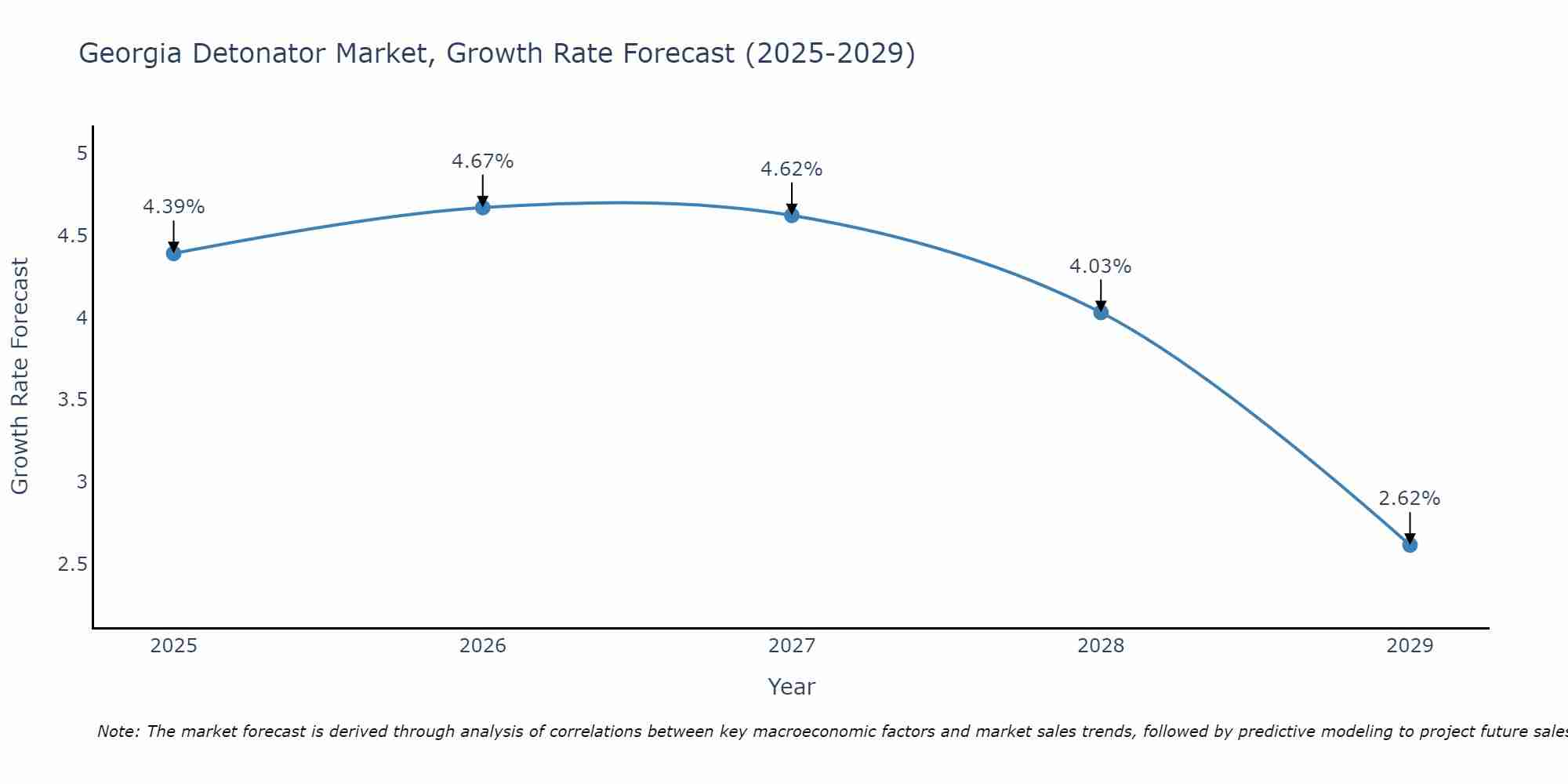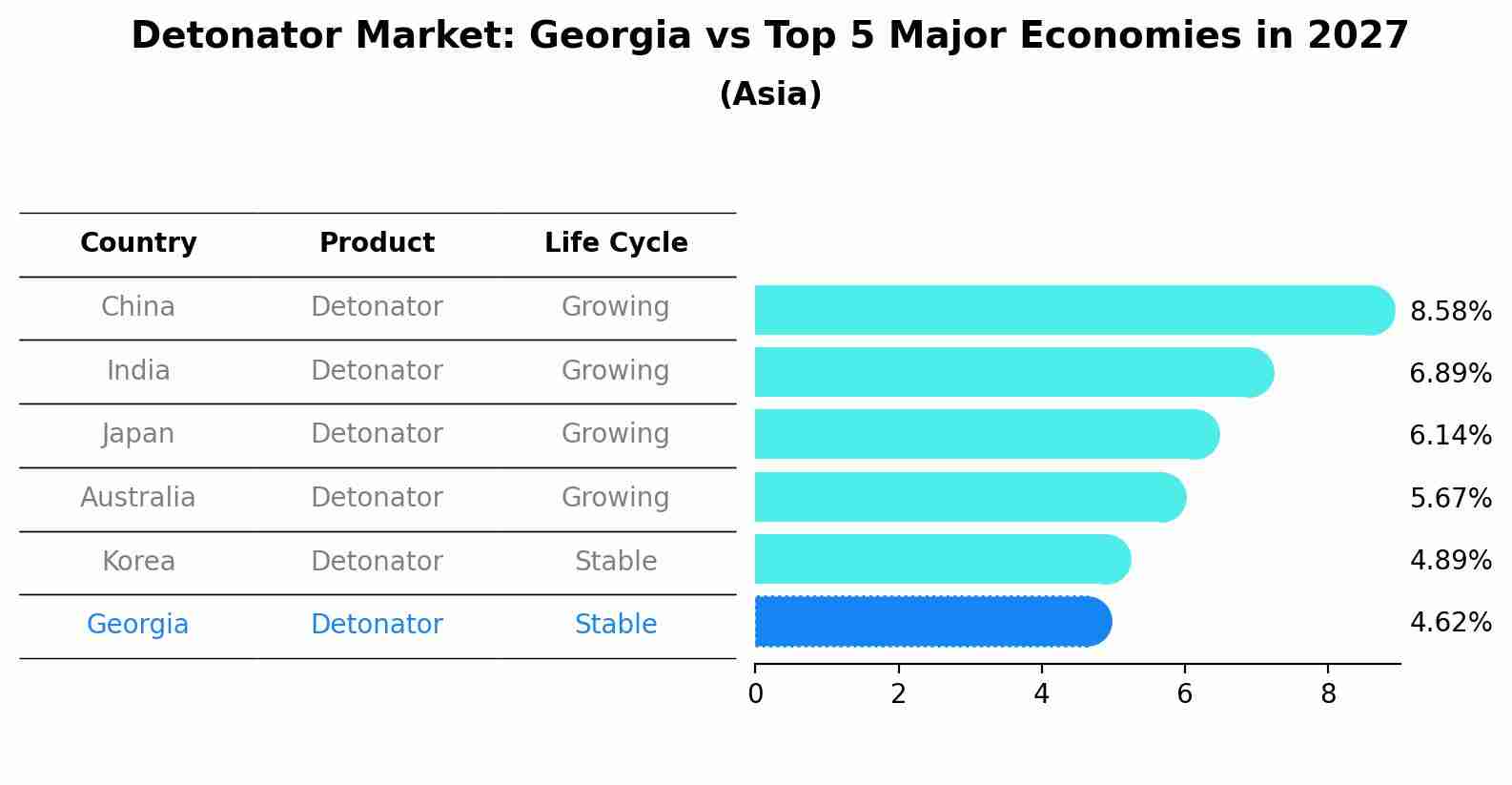Georgia Detonator Market Outlook | Trends, Companies, Share, COVID-19 IMPACT, Size, Revenue, Analysis, Industry, Growth, Forecast & Value
| Product Code: ETC418616 | Publication Date: Oct 2022 | Updated Date: Aug 2025 | Product Type: Market Research Report | |
| Publisher: 6Wresearch | Author: Ravi Bhandari | No. of Pages: 75 | No. of Figures: 35 | No. of Tables: 20 |
Georgia Detonator Market Size Growth Rate
The Georgia Detonator Market is projected to witness mixed growth rate patterns during 2025 to 2029. The growth rate begins at 4.39% in 2025, climbs to a high of 4.67% in 2026, and moderates to 2.62% by 2029.

Detonator Market: Georgia vs Top 5 Major Economies in 2027 (Asia)
In the Asia region, the Detonator market in Georgia is projected to expand at a stable growth rate of 4.62% by 2027. The largest economy is China, followed by India, Japan, Australia and South Korea.

Georgia Detonator Market Overview
The detonator market in Georgia is witnessing steady growth, driven by the increasing demand for explosives in mining, construction, quarrying, and defense applications. Detonators are specialized devices used to initiate explosive charges for various purposes, including rock blasting, demolition, and fireworks displays. With the expansion of infrastructure projects, such as road construction, tunneling, and urban development, there is a growing need for efficient and reliable detonation solutions in Georgia. Moreover, advancements in detonator technology, such as electronic detonators and programmable timing systems, are enhancing safety, precision, and productivity in explosive operations. Additionally, stringent regulations regarding explosives handling and safety standards are driving market growth by promoting the adoption of advanced detonation systems in Georgia.
Drivers of the market
The increasing demand for explosives in mining, construction, and defense industries is driving the growth of the detonator market in Georgia. Additionally, advancements in detonator technology, such as electronic detonators offering precise timing and control, are boosting market expansion.
Challenges of the market
The Georgia Detonator Market confronts challenges related to safety regulations, supply chain management, and market demand volatility. Adhering to stringent safety standards and regulatory requirements for detonator manufacturing and transportation necessitates continuous compliance monitoring and investment in quality control measures. Moreover, optimizing supply chain logistics to ensure timely delivery of detonators while minimizing risks associated with handling and storage requires robust risk management strategies. Additionally, navigating market fluctuations and demand variability driven by factors such as mining activity and infrastructure projects poses challenges for market players.
Government Policy of the market
The Georgia government has implemented several policies to regulate and support the detonator market, ensuring the safety, security, and responsible use of explosive initiation devices in mining, construction, and other industries. Regulatory agencies such as the Georgia Department of Natural Resources and the Georgia State Fire Marshal`s Office oversee the licensing, storage, transportation, and handling of detonators and explosive materials, ensuring compliance with state and federal regulations regarding safety, security, and environmental protection. Additionally, the government may provide training and certification programs for individuals involved in the use of detonators, promoting best practices and risk mitigation strategies to prevent accidents and incidents in the workplace. Furthermore, the Georgia Department of Economic Development may collaborate with industry stakeholders to promote Georgia as a center for detonator manufacturing and innovation, attracting investment and talent to the state and stimulating economic growth and job creation in the explosives sector. Overall, these policies aim to ensure that detonators are manufactured, distributed, and used safely and responsibly to protect workers, communities, and the environment while also supporting the competitiveness and sustainability of Georgia explosives industry.
Key Highlights of the Report:
- Georgia Detonator Market Outlook
- Market Size of Georgia Detonator Market, 2021
- Forecast of Georgia Detonator Market, 2028
- Historical Data and Forecast of Georgia Detonator Revenues & Volume for the Period 2018 - 2028
- Georgia Detonator Market Trend Evolution
- Georgia Detonator Market Drivers and Challenges
- Georgia Detonator Price Trends
- Georgia Detonator Porter's Five Forces
- Georgia Detonator Industry Life Cycle
- Historical Data and Forecast of Georgia Detonator Market Revenues & Volume By Type for the Period 2018 - 2028
- Historical Data and Forecast of Georgia Detonator Market Revenues & Volume By Industrial electric detonators for the Period 2018 - 2028
- Historical Data and Forecast of Georgia Detonator Market Revenues & Volume By Shock Tube Detonators for the Period 2018 - 2028
- Historical Data and Forecast of Georgia Detonator Market Revenues & Volume By Application for the Period 2018 - 2028
- Historical Data and Forecast of Georgia Detonator Market Revenues & Volume By Coal Mines for the Period 2018 - 2028
- Historical Data and Forecast of Georgia Detonator Market Revenues & Volume By Metal Mines for the Period 2018 - 2028
- Historical Data and Forecast of Georgia Detonator Market Revenues & Volume By Non-metal Mines for the Period 2018 - 2028
- Historical Data and Forecast of Georgia Detonator Market Revenues & Volume By Railway/road for the Period 2018 - 2028
- Historical Data and Forecast of Georgia Detonator Market Revenues & Volume By Hydraulic & Hydropower for the Period 2018 - 2028
- Georgia Detonator Import Export Trade Statistics
- Market Opportunity Assessment By Type
- Market Opportunity Assessment By Application
- Georgia Detonator Top Companies Market Share
- Georgia Detonator Competitive Benchmarking By Technical and Operational Parameters
- Georgia Detonator Company Profiles
- Georgia Detonator Key Strategic Recommendations
Frequently Asked Questions About the Market Study (FAQs):
1 Executive Summary |
2 Introduction |
2.1 Key Highlights of the Report |
2.2 Report Description |
2.3 Market Scope & Segmentation |
2.4 Research Methodology |
2.5 Assumptions |
3 Georgia Detonator Market Overview |
3.1 Georgia Country Macro Economic Indicators |
3.2 Georgia Detonator Market Revenues & Volume, 2021 & 2028F |
3.3 Georgia Detonator Market - Industry Life Cycle |
3.4 Georgia Detonator Market - Porter's Five Forces |
3.5 Georgia Detonator Market Revenues & Volume Share, By Type, 2021 & 2028F |
3.6 Georgia Detonator Market Revenues & Volume Share, By Application, 2021 & 2028F |
4 Georgia Detonator Market Dynamics |
4.1 Impact Analysis |
4.2 Market Drivers |
4.2.1 Increasing demand for mining activities in Georgia |
4.2.2 Growing construction industry in the region |
4.2.3 Rising investments in infrastructure development projects |
4.3 Market Restraints |
4.3.1 Stringent regulations and safety standards for detonator use |
4.3.2 Fluctuating prices of raw materials |
4.3.3 Presence of alternative technologies for explosives |
5 Georgia Detonator Market Trends |
6 Georgia Detonator Market, By Types |
6.1 Georgia Detonator Market, By Type |
6.1.1 Overview and Analysis |
6.1.2 Georgia Detonator Market Revenues & Volume, By Type, 2018 - 2028F |
6.1.3 Georgia Detonator Market Revenues & Volume, By Industrial electric detonators, 2018 - 2028F |
6.1.4 Georgia Detonator Market Revenues & Volume, By Shock Tube Detonators, 2018 - 2028F |
6.2 Georgia Detonator Market, By Application |
6.2.1 Overview and Analysis |
6.2.2 Georgia Detonator Market Revenues & Volume, By Coal Mines, 2018 - 2028F |
6.2.3 Georgia Detonator Market Revenues & Volume, By Metal Mines, 2018 - 2028F |
6.2.4 Georgia Detonator Market Revenues & Volume, By Non-metal Mines, 2018 - 2028F |
6.2.5 Georgia Detonator Market Revenues & Volume, By Railway/road, 2018 - 2028F |
6.2.6 Georgia Detonator Market Revenues & Volume, By Hydraulic & Hydropower, 2018 - 2028F |
7 Georgia Detonator Market Import-Export Trade Statistics |
7.1 Georgia Detonator Market Export to Major Countries |
7.2 Georgia Detonator Market Imports from Major Countries |
8 Georgia Detonator Market Key Performance Indicators |
8.1 Number of new mining projects in Georgia |
8.2 Investment in infrastructure projects using detonators |
8.3 Adoption rate of advanced detonator technologies |
8.4 Regulatory compliance rate for detonator use |
8.5 Market penetration of detonators in the construction industry |
9 Georgia Detonator Market - Opportunity Assessment |
9.1 Georgia Detonator Market Opportunity Assessment, By Type, 2021 & 2028F |
9.2 Georgia Detonator Market Opportunity Assessment, By Application, 2021 & 2028F |
10 Georgia Detonator Market - Competitive Landscape |
10.1 Georgia Detonator Market Revenue Share, By Companies, 2021 |
10.2 Georgia Detonator Market Competitive Benchmarking, By Operating and Technical Parameters |
11 Company Profiles |
12 Recommendations |
13 Disclaimer |
- Single User License$ 1,995
- Department License$ 2,400
- Site License$ 3,120
- Global License$ 3,795
Search
Thought Leadership and Analyst Meet
Our Clients
Related Reports
- Canada Oil and Gas Market (2026-2032) | Share, Segmentation, Value, Industry, Trends, Forecast, Analysis, Size & Revenue, Growth, Competitive Landscape, Outlook, Companies
- Germany Breakfast Food Market (2026-2032) | Industry, Share, Growth, Size, Companies, Value, Analysis, Revenue, Trends, Forecast & Outlook
- Australia Briquette Market (2025-2031) | Growth, Size, Revenue, Forecast, Analysis, Trends, Value, Share, Industry & Companies
- Vietnam System Integrator Market (2025-2031) | Size, Companies, Analysis, Industry, Value, Forecast, Growth, Trends, Revenue & Share
- ASEAN and Thailand Brain Health Supplements Market (2025-2031) | Strategy, Consumer Insights, Analysis, Investment Trends, Opportunities, Growth, Size, Share, Industry, Revenue, Segments, Value, Segmentation, Supply, Forecast, Restraints, Outlook, Competition, Drivers, Trends, Demand, Pricing Analysis, Competitive, Strategic Insights, Companies, Challenges
- ASEAN Bearings Market (2025-2031) | Strategy, Consumer Insights, Analysis, Investment Trends, Opportunities, Growth, Size, Share, Industry, Revenue, Segments, Value, Segmentation, Supply, Forecast, Restraints, Outlook, Competition, Drivers, Trends, Demand, Pricing Analysis, Competitive, Strategic Insights, Companies, Challenges
- Europe Flooring Market (2025-2031) | Outlook, Share, Industry, Trends, Forecast, Companies, Revenue, Size, Analysis, Growth & Value
- Saudi Arabia Manlift Market (2025-2031) | Outlook, Size, Growth, Trends, Companies, Industry, Revenue, Value, Share, Forecast & Analysis
- Uganda Excavator, Crane, and Wheel Loaders Market (2025-2031) | Strategy, Consumer Insights, Analysis, Investment Trends, Opportunities, Growth, Size, Share, Industry, Revenue, Segments, Value, Segmentation, Supply, Forecast, Restraints, Outlook, Competition, Drivers, Trends, Demand, Pricing Analysis, Competitive, Strategic Insights, Companies, Challenges
- Rwanda Excavator, Crane, and Wheel Loaders Market (2025-2031) | Strategy, Consumer Insights, Analysis, Investment Trends, Opportunities, Growth, Size, Share, Industry, Revenue, Segments, Value, Segmentation, Supply, Forecast, Restraints, Outlook, Competition, Drivers, Trends, Demand, Pricing Analysis, Competitive, Strategic Insights, Companies, Challenges
Industry Events and Analyst Meet
Whitepaper
- Middle East & Africa Commercial Security Market Click here to view more.
- Middle East & Africa Fire Safety Systems & Equipment Market Click here to view more.
- GCC Drone Market Click here to view more.
- Middle East Lighting Fixture Market Click here to view more.
- GCC Physical & Perimeter Security Market Click here to view more.
6WResearch In News
- Doha a strategic location for EV manufacturing hub: IPA Qatar
- Demand for luxury TVs surging in the GCC, says Samsung
- Empowering Growth: The Thriving Journey of Bangladesh’s Cable Industry
- Demand for luxury TVs surging in the GCC, says Samsung
- Video call with a traditional healer? Once unthinkable, it’s now common in South Africa
- Intelligent Buildings To Smooth GCC’s Path To Net Zero


















